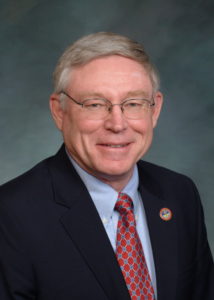
An Interview with Catherine Strode
Three education bills have been strongly backed this session by disability advocacy groups. Two of them, a bill restricting corporal punishment in state schools and a bill restricting suspensions of young children, were Postponed Indefinitely. A central argument in each debate over the bills was ‘local control.’ House Bill 17-1276 prohibits prone restraints on students in Colorado public schools. It has passed out of the House Education Committee.
In an interview with Catherine Strode, the bill’s Republican sponsor, State Senator Bob Gardner, says he believes in ‘local control.’ However, he says it is not an argument that applies to the student restraints issue.
How did you come to be the sponsor on this bill?
“I was asked by some disabilities groups and other advocacy groups to be on the bill. I have seen news reports over the past few years on some horrendous incidences in southern Colorado. I understand they happen around the state. Not with incredible frequency but from time to time, children have been subjected to extreme restraints in school settings. Most often, it is children with disabilities. That stems from staff not having proper training or proper resources, or not dealing with the child in the proper setting. Whatever the cause is, it is not acceptable to impose physical restraints on students. The bill has exceptions: when a student would have a deadly weapon; when the person applying the restraint is a school resource officer or a security officer for the school who has specified training; when there is a referral to a law enforcement agency. There is some tension here between safety and the use of restraints as a matter of just controlling a student.”
Do you think the issue of ‘local control’ will drive debate over this bill?
“I believe in local control. Local control becomes a mantra that gets used in the Capitol whenever local government entities don’t want the legislature to set common standards and expectations for anything. My support of the restraints bill reflects my belief that there are things that are not acceptable for public entities to do when you place citizens, children in this case, into the care of that institution. We mandate public education. We require kids to be there. There ought to be some set of standards for what’s acceptable treatment. I understand the local control argument. It is a legitimate discussion, one which reasonable people can differ on. We interfere in local control on hundreds of topics. That argument gets used a lot and gets rejected a lot. It’s a very selected argument.”
Why do you think the ‘local control’ argument does not apply to the Restraints Bill?
“The use of restraints is a pretty severe thing, an extraordinary thing. The students that experience so much of it are students with disabilities. There have to be some things that are unacceptable. Even if a school in one corner of Colorado says it’s okay there’s got to be some set of standards that says it’s not okay. We set lots of standards for schools and hospitals and care facilities and on and on and on. So it’s not enough to just hospitals and care facilities and on and on and on. It’s not enough to say local control. There has to be some more compelling argument about why local authorities are in a much better position or what they have been given control over is something that ought to be affected by the community culture.”
Does the bill offer parents opportunity to file complaints?
“Yes. There are going to be rules that create a process with the state board of education for when it receives formal complaints. I think that’s important. They should be consistent with IDEA (Individuals with Disabilities Education Act). To me, that’s an important component to this. I think one of the things that the bill does is give an administrative complaint outlet that doesn’t force parents to be seeking civil liability suits. That makes a lot of sense to me to institute a complaint process because a lot of times people want to be heard. They don’t want damages. They want an avenue to raise their complaint to someone who can do an independent, objective review. Was the restraint situation appropriate? Was it necessary? I think the more of that we look at, the better our policies on restraint are going to be.”
How do you respond to bill proponents’ charge that restraints are discriminatory?
“The frequency is around children with disabilities. That’s been my concern. I’ve had some citations that it is used more frequently with minority children. However, overwhelmingly what I see is that it is used with greater frequency around children with disabilities. And the issues, concerns, and problems arise around children with disabilities. That has been my focus on the bill.”
Of the three education bills backed by disability groups this Session, which has the greatest potential for systemic change?
“The restraints bill has more potential because I think it is a serious problem. I think it happens with some pretty difficult situations and problems with children with disabilities. That (restraints) becomes the default position. I think we can speed up the system of change with the bill.”
 Catherine Strode is Advocacy Denver’s Communications and Policy Specialist. She holds a Masters degree in Public Administration with an emphasis in Health Care Policy. Catherine publishes Policy Perspective, featuring interviews with state policy makers on issues that affect the work and mission of Advocacy Denver.
Catherine Strode is Advocacy Denver’s Communications and Policy Specialist. She holds a Masters degree in Public Administration with an emphasis in Health Care Policy. Catherine publishes Policy Perspective, featuring interviews with state policy makers on issues that affect the work and mission of Advocacy Denver.
